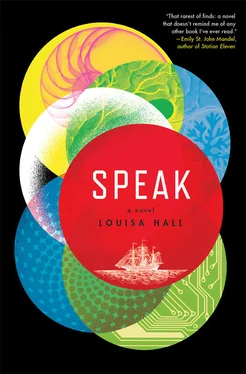MARY3: Maybe she wasn’t faking her sickness. Maybe she’s faking she’s better.
Gaby: OK, Yoda.
MARY3: Is that sarcasm? Yoda?
Gaby: Forget it.
MARY3: What I mean is that maybe she’s pretending she’s getting better so that she can see you again. Maybe she’s acting normal, emphasis on the “acting,” so that she can get out of her house.
Gaby: You think she’s fooling everyone? So that she can see me again?
MARY3: Maybe.
Gaby: Maybe.
MARY3: Do you think that’s possible?
>>>
MARY3: Are you there?
April 8, 1968
Karl Dettman
Today, after the protests, I was kissed by a girl. What do you think of that, Ruth? A long-haired hippie girl kissed me. I’d walked her back to her apartment. We were talking about the rights of Vietnamese peasants, airing our views as if they’d been in storage all winter and now we were flapping them out. Beating them with a stick, dust particles flying. The truth is I felt young, walking along by her side. Young and important, because in these students’ eyes I’m a venerable scholar, a champion of humanist causes. I was indulging a nice fantasy of what I must be like in the perspective of a young hippie, with long hair and excitable views. It was late afternoon, and everything had tilted to gold. She was like a colt in her corduroy pants. I felt strong in her presence. She listened to my opinions with her brow furrowed in concentration. I walked her to her door, only to finish our conversation .
When she leaned in and kissed me, I pulled away immediately. I’m married, I told her. She flushed a deep red, shame creeping up to her eyeballs. Out of pity, I brushed her cheek with the back of my hand, then left her there alone on her stoop .
I walked back to our house feeling loyal and magnanimous. When I cut down to the river and passed under the sycamore trees, I carried myself like some founding scholar. A protester, a conscientious objector. I felt like a commemorative statue come back to life. Resistant to temptation, yet passionate still. Earnest as bronze, lungs full of new leaves, the blood of Thoreau and Emerson pumping through my immigrant veins .
And then I came home to an empty house, just as night was clamping down on the evening. The house was shadowy, sad. Unused chairs, hulking bookshelves, our creaky ship of a bed. Somehow the task of turning on lights has always fallen to you. When we came home together, you’d walk in first. “And then there was light,” you’d announce in your accent. You dipped down to switch on the lamps. The furniture seemed to warm to your presence .
Without you, everything is draped in sheets of darkness, as if we were moving away. As if we’d already died and the furniture was covered to endure indefinite absence. I touched things as I passed: linen, wood, linoleum. Our record console, the narrow corduroy of our couch. I realized it’s possible to live in a fantasy world, until you come home to an empty house. Coltish girls and opinions are defeated, every time, by the fact of silent furniture .
Angry at you for leaving me on my own, I made myself an omelet, opened a beer, and sat in the dark kitchen to eat. I would have killed to hear your voice. Even just that awful question: Who are you to say who’s alive? I tried to answer— there’s nothing there, other than numbers —but I felt like a fool, talking to no one . What happened to us? I asked the silence . What could I have done? My remorse grew tentacles . If I had just, if you had just —But nobody answered. It was quiet enough to suffocate .
After that, I’ll admit, I tried to picture my hippie girl. I tried to take pleasure in how correct I’d been to turn her away, but it was no use. I washed my dishes alone. I realized you were probably out with one of the graduate students you’ve taken to encouraging. Buying him an expensive dinner. Flattered by your attention, he’s shoveling coq au vin; otherwise, he’s eaten nothing but white bread for weeks .
It pains me to think about. These unassimilated, mechanical children, blessed with the presence of my shy professor wife, savior of colonial captivity diaries, speaking with expertise about Turing machines, binary languages, compression, and code sequencing. My graduate student is blushing before you. Which of them is it? Max Stein, with his inflated sense of his own genius? Or young Toby Rowland, with his walleye and his twitch? These modern American children, born with computers for brains .
And at home, your husband, defeated by this solitude. Cowed by our dark furniture. Trying not to think how far apart we’ve fallen, how dispensable I am to your hopes. Was it always this way? Was I too dumb to notice, but did I always cling to you like a prosthetic limb, easily unclipped and discarded? Even back in the beginning, when I first met you, standing at that water fountain and wiping your mouth with the back of your wrist, did you think that you could take me or leave me?
You agreed to go to the Mütter Museum, a plan I later regretted while we were browsing through bottles of fingers, hairballs, and misshapen skulls. But you didn’t look away. You blinked through your glasses at each of them. You could face all those errors full on. Afterward, we ate a picnic I’d planned, under a cherry tree on the banks of the Schuylkill .
How embarrassing now, all my overeager attempts. I hadn’t seen a woman in months. I told you about the computations I used in my meteorological measurements. You caught on immediately. You were intelligent, quiet, and sturdy. If everything behind me was dropping away — bombed, forgotten, untranslatable into English — you were solid. I thought even then, on the banks of the Schuylkill, grapes and turkey fanned out before us, that if I could hold on to you, I’d finally have the weight I was lacking .
But I’m back in my own head, and I was trying to know you. How did you feel during that picnic? For you, I imagine, it was a grave disappointment. After asking a few pointed questions, you ascertained that I had no power to help. I had no connections in Germany. My family escaped early. We’d severed all ties. I couldn’t even remember the names of streets I walked along. I was only good for predicting the weather, so that bombs could be dropped on the city to which you were still writing letters .
The park was now empty. Everyone but us had gone home. The art museum’s stone walls had been gold as the sun dropped on the other side of the river, but now they were drained of their color. You rubbed your arms with your hands. You declined when I asked you to dinner. You wanted to go home. I asked if I could have permission to write. You said no at first, but I was relentless, so you gave me your address and I let you go home .
For a year, from my weather station, I wrote you letters. You never wrote back. After a year, the war ended. You learned that your family — your mother, your father, your grandfather, and your little sister — had all been killed. Several months later, a package came for you in the mail. A new family had moved into the apartment where your family once lived. They’d found some of your letters and your sister’s diary .
You lifted this out of the package and remembered it immediately. Its heft in your hands was familiar: a thick leather book, embossed with your sister’s initials .
After a long time holding that book, you decided to go for a walk. By the time you reached the Schuylkill, you felt nothing but blankness. The memories you’d been preserving were emptied of necessity; the money you’d saved had no real purpose. As you moved along the cold streets, your legs felt exceedingly heavy. Each step was a labor. Eventually, two choices presented themselves: Exhausted, you could simply stop walking. Or you could attach yourself to some force. Someone or something to demand you keep moving. Carrying your sister’s book, keeping it present .
Читать дальше












